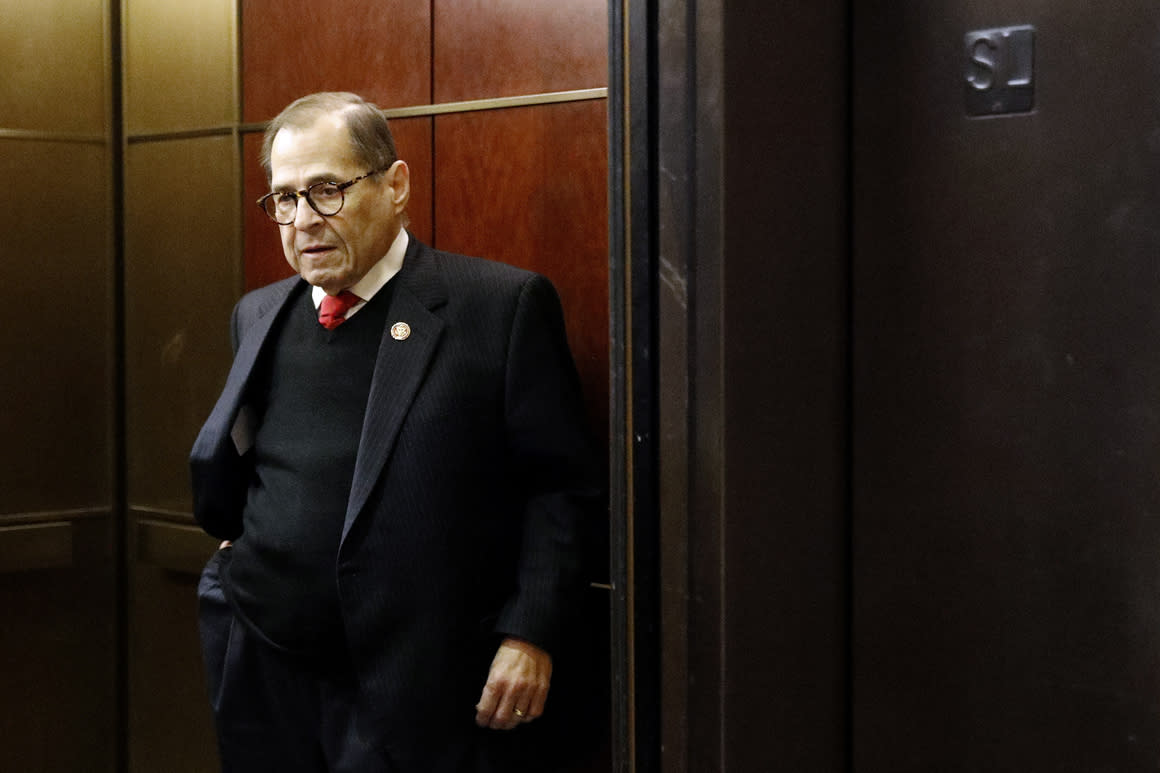White House won’t take part in first House Judiciary impeachment hearing

The White House informed House Democrats on Sunday that it will not participate in the Judiciary Committee’s first impeachment hearing, excoriating Democrats’ impeachment inquiry as a “baseless” and “partisan” exercise in scathing five-page letter to the panel’s chairman.
The decision indicates that President Donald Trump has listened to his allies and some congressional Republicans who argued that a White House presence at the hearing would validate a process they have harangued as illegitimate and partisan.
It also means Trump will lean heavily on his closest GOP allies on the panel — including Reps. Jim Jordan of Ohio, John Ratcliffe of Texas and Matt Gaetz of Florida — to mount an impeachment defense during the Judiciary panel’s first hearing on Wednesday featuring legal scholars.
“Under the current circumstances, we do not intend to participate in your Wednesday hearing,” White House Counsel Pat Cipollone wrote in a letter to Judiciary Committee Chairman Jerrold Nadler (D-N.Y.), adding that “an invitation to an academic discussion with law professors does not begin to provide the president with any semblance of a fair process.”
Nadler had asked Trump to indicate by Sunday whether the president himself or a White House attorney would attend Wednesday’s hearing, an offer that Democrats said was an attempt to afford due process to Trump as he faces a likely impeachment vote before the end of the month.
Nadler has also asked Trump to reveal by the end of the week whether he intends to participate in any aspect of the Judiciary Committee’s impeachment proceedings, which are expected to continue into the following week. Notably, Cipollone left open the possibility that the White House would participate in future hearings.
Wednesday’s hearing will be largely a discussion of constitutional issues, with lawmakers set to hear from a panel of constitutional scholars and law professors about the impeachment process — and whether an assortment of allegations against Trump meet the threshold of “high crimes and misdemeanors” outlined in the Constitution.
Nadler has yet to identify any witnesses, but Rep. Doug Collins, the top Republican on the committee, has requested that the witness panel include an equal number of Democratic- and GOP-selected scholars.
“This is a failure of the Judiciary Committee to be able to talk to fact witnesses, to be able to talk to the people that have actually been a part of this, and actually have the president viably participate in his own defense — which he’s not had the opportunity to do now,” the Georgia Republican said on “Fox News Sunday.“
Cipollone’s Sunday letter echoes his past statements on the impeachment inquiry, which he has dubbed illegitimate and said it deprives Trump of meaningful due process. The White House and its GOP allies have accused Democrats of establishing an impeachment process that fails to give Trump and his lawyers the opportunity to present evidence or cross-examine witnesses.
“It is too late to cure the profound procedural deficiencies that have tainted this entire inquiry,” Cipollone wrote Sunday, adding: “We cannot fairly be expected to participate in a hearing while the witnesses are yet to be named and while it remains unclear whether the Judiciary Committee will afford the president a fair process through additional hearings.”
Democrats contend that they have provided Trump with adequate due process, noting that in previous impeachments, the investigations were conducted primarily by prosecutors who faced no pushback. Republicans, they note, including several closely aligned with the White House, have been included in every witness interview and have been able to ask questions.
Wednesday’s hearing will be the first in a series the Judiciary Committee holds as it prepares to draft articles of impeachment against the president. House Democratic leaders are aiming to wrap up the impeachment process by the end of the year.
The House Intelligence Committee is expected to vote Tuesday evening to formally approve its report recommending that Trump be removed from office over allegations that he abused the power of his presidency to pressure a foreign leader to investigate his political rivals. The allegation is expected to form the core of any impeachment articles ultimately considered by the House.
Democrats are also wrestling with whether to add additional articles, and are strongly considering including an “obstruction of Congress” charge, citing Trump’s widespread efforts to stonewall congressional investigations, including the impeachment probe. They are also considering whether to fold in any of the evidence collected by special counsel Robert Mueller about Trump’s efforts to obstruct his probe of Russian interference in the 2016 election.

